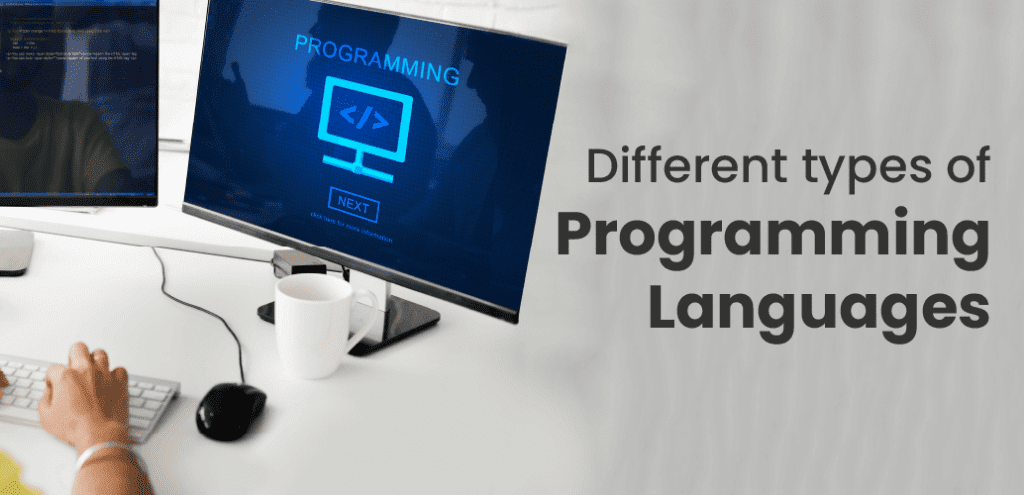Blog > Which are the Best Programming Languages for Beginners to Learn First?
Which are the Best Programming Languages for Beginners to Learn First?
September 9th, 2022

Programming and coding for beginners especially, seems like a daunting task for most, however it doesn't have to be. Taking it slow and starting with any one of these top programming languages will definitely help you start your journey as a programmer smoothly.
In this blog, we will cover several such languages you can start your IT career with. There are several considerations you must take into account before you start learning any programming language.
You should consider what level you would like to start at and the difficulty of the language you choose. You must also consider why you are picking up a programming language. Are you looking to build Mobile Apps or develop software? Knowing your end goal is important before you make a choice.
But first, let's understand the various programming languages out there.

What is a Programming Language?
A programming language is the way developers communicate with computers. In order to get a computer to perform a particular task or for it to control an external device, we need to communicate using machine language.
To put it simply, a program is a set of rules written in a programming language, in order for a computer to execute a particular task.
What are the different levels of programming languages?
There are three main levels of programming languages. They are Machine Language, Assembly Language and High-level Language.
Machine language is closer to what computers work with and is therefore easier for machines to understand. But these are not understood by human beings easily.
Assembly languages are slightly easier to understand by people. In assembly languages, computer language is converted into English commands and numbers. Before the Assembly code is executed however, it is converted back into machine language by an Assembler.
High-Level Languages are almost entirely based on English syntax and numbers. Most High-level languages are scripting languages. This means that they aren't converted back into machine language right until the very last moment when the code has to be executed. These kinds of languages are much easier to understand for programmers and developers. Most high-level languages need compilers for their instructions to be converted into machine language.

Different types of Programming Languages
We can still further classify programming languages into:
- Object Oriented Programming Languages, or OOP, are taught and used by most programmers. OOP relies on the use of Objects and Classes. To put it simply, OOP runs on these reusable blueprints of code (Classes) that are used to make different objects that mimic the real world. Examples of Object Oriented Programming Languages would include Java, Javascript, C, C++ and Python.
- Logic Programming Languages are based completely on facts and rules. To compute logic, there must be a base of facts and knowledge. This base is known as Predicates. These predicates are used to create queries. Most Logic Programming Languages are based on queries which are further based on facts. For example, this is what Logic Programming looks like - F is true if D1, B2, and E3 are true.
- Procedural Languages follow a set of orders or commands chronologically. They make use of functions, conditional statements, and variables to build programs that the computer uses to calculate and display the wanted outcome. Some Examples include Pascal and FORTRAN.
- Functional programming binds everything together with pure mathematical functions. They are designed in a way that can handle complex symbolic computations. Some famous examples of functional programming include - Lisp, Python and Haskell.
- Scripting Languages, use a high-level construct and they interpret and execute one command at a time. These languages are easy to understand and execute for programmers. Some examples include C and C++.
Now that you have an idea of the different kinds of coding languages, it brings us back to the original question, what coding languages should beginners learn?
We have listed our top picks for you!

Coding and Programming Language for Beginners
Python
Python is a free, open-source programming language that has extensive support modules. It is easy to integrate with web services, making it popular for machine learning and deep learning.
Python for beginners especially is the easiest to pick up and is one the most popular programming languages out there today. It is based entirely on English syntax. Instead of having to start with complicated syntax rules, you can directly start learning Python because it reads like English itself. So you get coding experience, without having to worry about small rules that are important in other languages.
| Python is also majorly in demand! Since it can be used for web development, graphic user interfaces (GUIs) and software development, recruiters are always on the lookout for Python programmers. |
And for good reason too - Python was used to build Instagram, Youtube and Spotify.
Java
Java is an object-oriented programming language that is widely used for almost all types of software development and web applications. It is a high-level language making it easy to understand.
The defining principle of Java is "written once run anywhere", meaning that, once written, it can be executed on any device and can work across platforms. This is why Java programming is a very important skill, highly coveted by recruiters.
Apart from this, Java programming was used to build the foundation for the Android operating system. It is also used in software development for iOS. Java is also used in the back-end development for Amazon, Google and Twitter.
| A major pro about learning Java is its large online community, you can always receive help if you ever have any queries. |
However, it is important to note that Java programming for beginners is slightly more difficult to grasp, compared to Python.
C++ & C Programming for Beginners
C was the first programming language that all other programming languages were based on, making learning C programming almost fundamental. Once you learn C programming, you can easily pick up any other programming language. C and C++ were one of the most popular languages back in the day. C has a flexible and efficient memory management system, making it ideal to build the UNIX operating system.
If you learn C programming, it will become very easy for you to pick up C++ as well. C++ was built as a more advanced version of C as a system programming language. Both languages are used extensively in Computer Science and programming.
A key difference between C and C++ is that C is a procedural language whereas C++ is an object oriented programming language.
| Both C and C++ are regarded as high-performance languages. They are used extensively in places where developers want to target the performance of a certain program. |
This is why most video games and intensive applications like Adobe and Mozilla Firefox, make use of C or C++.

How to learn coding online?
Now that you know about the various programming languages, let's get to work. How can you learn the programming language of your choice?
Back in the day, lack of options and facilities usually meant that people had to opt for Computer Science classes and invest a lot of money to learn programming. However, that isn't the case anymore.
Now with the advent and advancement of computers, we can easily learn coding online. Through online tutorials, study materials and other available resources. In fact, you don't even need to search that far when it comes to the most popular programming languages.
upGrad Campus has a course made especially for you! Watch out for our Essentials of Programming course which explains in-depth concepts for C, C++, Java, Python and Data Structures. You get to practice these with hands-on examples and apply the learnings to real-world problems.
We hope this article aided you in your decision about which programming languages to learn first.
If you have any questions, feel free to leave them in the comments section below.






Add a Comment